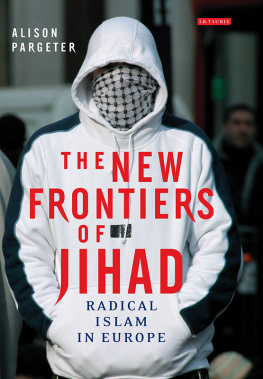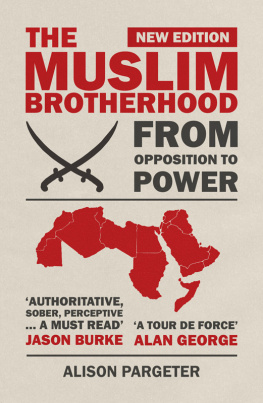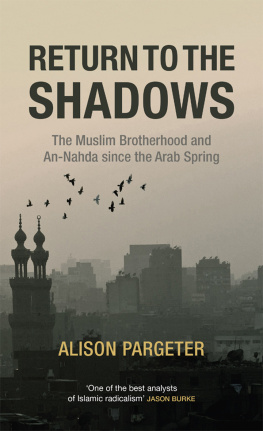Published in 2008 by I.B.Tauris & Co. Ltd
6 Salem Road, London W2 4BU
175 Fifth Avenue, New York, NY 10010
www.ibtauris.com
Copyright 2008 Alison Pargeter
The right of Alison Pargeter to be identified as the author of this work has been asserted by the author in accordance with the Copyright, Designs and Patents Act 1988.
All rights reserved. Except for brief quotations in a review, this book, or any part thereof, may not be reproduced, stored in or introduced into a retrieval system, or transmitted, in any form or by any means, electronic, mechanical, photocopying, recording or otherwise, without the prior written permission of the publisher.
ISBN: 978 1 84511 391 9
A full CIP record for this book is available from the British Library
A full CIP record for this book is available from the Library of Congress
Library of Congress catalog card: available
Typeset in Goudy Old Style by A. & D. Worthington, Newmarket, Suffolk
INTRODUCTION
T he arrests of scores of terrorist suspects across Europe following 9/11, as well as the attacks in London and Madrid, were a stark reminder that the continent was host to militant Islamists of varying hues. In some cases these radicals had been resident in the continent for decades and had been quietly working away to further the cause of jihad, largely against their own regimes in the Islamic world. From veterans of the war in Afghanistan, to members of Middle Eastern insurgent groups, to second-generation immigrants and European converts, these radicals have all contributed to the image of Europe as a breeding ground for religiously inspired political violence. Yet very little is known about exactly who these Islamists are, why they are here and how and why they became involved in the world of militant Islam.
Much of the commentary that has appeared in the post-9/11 era has tended to lump all of these Islamists into one basket, as if they all share the same aims and objectives and as if they are part of one globalized movement whose primary target is the West. In fact analysts and the media often talk about globalized Islam, international terrorism, and the global war on terror as if we are dealing with one monolithic movement that has been born out of the modern era. Similarly it is widely assumed that these Islamists are somehow linked to or share the same ideology as Al-Qaida and Osama Bin Ladin. Yet in many cases these links and perceived aspirations are often more tenuous than is suggested and the particularities of the various groups and movements are regularly overlooked. Yet it is these very particularities and differences that have given the Islamist movement its flavour and colour and that help to explain the varying motivations of those who have taken up the cause of jihad. Moreover, despite the assertion by commentators and by many Islamists themselves that they represent a unified body working towards the same goal of establishing an Islamic state, the Islamist movement in Europe is as plagued by division, petty in-fighting and battles of egos as any ideological movement anywhere else in the world.
Moreover the assertions that those committing or supporting these acts of terrorism have been driven to hatred for the West by issues such as the Iraq war or Afghanistan also require further inspection. Indeed such assumptions fail to take into account the fact that anti-Western discourse is neither new nor the domain of the jihadists alone. Not only has it been used by Islamists since the early awakenings of the political Islamist movement that was conceived in the 1920s largely in response to the fall of the Ottoman Empire and to Western colonialism, it has long been used by a whole host of constituencies in the Middle East as a rallying cry. From the secularists to the nationalists to the left-wing movements, they have all sought to use anti-Westernism as a legitimizing factor. In fact a discourse that rejects the West and what the West stands for is intrinsically tied up with societies in the Islamic world and is symptomatic of the acute crisis that the region has been experiencing for decades. It is this very crisis that has been expressed by the Islamist movement since the early 1980s not only in the Islamic world, but also among Muslim communities in Europe and that at the most extreme end of the spectrum has become a cry of pain and despair. Indeed, radical Islam in Europe, as in the Islamic world, appears increasingly to have become an ideology of desperation, driven by frustration, helplessness and a sense of impotence.
Furthermore the post-9/11 world has left policymakers scratching their heads about the best way to tackle radicalism head on. As more and more alleged plots have been uncovered on the continent, there have been increasingly desperate attempts to understand how and why young Muslims in Europe have become so wrapped up in this militant ideology and how to devise strategies to prevent it from happening. Yet many of these attempts have placed this radicalism within a vacuum, as if what is occurring in Europe is somehow separated from the wider Islamic world. Europe of course is important in itself, but the radicalism that has developed in various European countries cannot simply be explained away by issues such as marginalization, integration or access to social justice. The issue is far wider and far more complex. Indeed if we want to understand the roots of this radicalism, it has to be placed in the context of broader developments in the Islamic world.
Based upon research I have been conducting over the past few years among Muslim communities in Europe, and the many conversations I have had with Islamists, from both the moderate and more radical end of the spectrum, this book seeks to offer an understanding of the particularities of the various Islamist camps operating in Europe and to show how, while they may be in Europe, much of the politics played out by these various groups and individuals is a direct result of what is occurring in the Islamic world. In fact Muslim communities in Europe have largely reflected events in the Islamic world or have been shaped by powers outside the continent.
Given the definitional minefield that accompanies any work on such issues, I should make clear that this book is primarily about those parts of the Muslim community that have taken up Islamic activism or who are involved in what is generally termed political Islam. This covers those who take up militancy or who espouse the use of violence as a vehicle through which to achieve their objectives, which I broadly refer to as militants or jihadists. It also covers those who I refer to as moderates, by which I mean specifically those who have taken up Islamic activism or who follow the ideology of groups such as the Muslim Brotherhood that do not generally espouse violence. Indeed these groups often refer to themselves as the moderate camp. Therefore I am not referring to Muslim communities more widely, or even those who are practising Muslims when I use the term moderate, as it has a specific political meaning. Indeed it should be remembered that there are large numbers of non-practising Muslims in Europe and even many practising Muslims who do not go to the mosque except to celebrate Islamic holidays, let alone subscribe to the same ideology as those involved in the Islamist scene. Therefore, although this book goes some way to explore the relationship between the Islamists and the wider Muslim communities in which they are situated, it should not be forgotten that in the European context both militants and moderates alike are minorities within a minority.
 Alison Pargeter is a Senior Research Associate at the Centre of International Studies at the University of Cambridge, where she is also a visiting scholar at Pembroke College. She has conducted numerous research projects on issues related to political Islam, violence and radicalization in Europe, North Africa and the Middle East.
Alison Pargeter is a Senior Research Associate at the Centre of International Studies at the University of Cambridge, where she is also a visiting scholar at Pembroke College. She has conducted numerous research projects on issues related to political Islam, violence and radicalization in Europe, North Africa and the Middle East.







![Simon Brett [Simon Brett] - Mrs. Pargeter’s Pound of Flesh](/uploads/posts/book/142156/thumbs/simon-brett-simon-brett-mrs-pargeter-s-pound.jpg)
![Simon Brett [Simon Brett] - Mrs. Pargeter’s Point of Honour](/uploads/posts/book/142155/thumbs/simon-brett-simon-brett-mrs-pargeter-s-point.jpg)
![Simon Brett [Simon Brett] - Mrs. Pargeter’s Plot](/uploads/posts/book/142154/thumbs/simon-brett-simon-brett-mrs-pargeter-s-plot.jpg)
![Simon Brett [Simon Brett] - Mrs. Pargeter’s Package](/uploads/posts/book/142153/thumbs/simon-brett-simon-brett-mrs-pargeter-s.jpg)